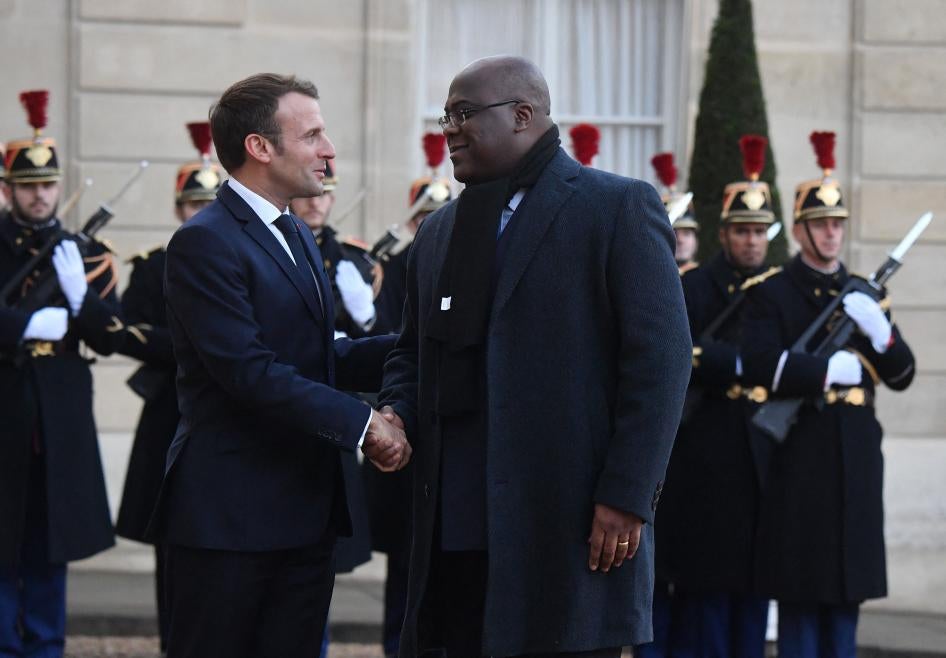Congolese President Félix Tshisekedi and French President Emmanuel Macron should discuss pressing human rights concerns during Macron's visit to the Democratic Republic of Congo on March 4, 2023, Human Rights Watch said today. Their agenda should include ensuring that elections slated for December are free, fair, and transparent, protecting civilians in conflict-affected areas, and holding those responsible for abuses to account.
The human rights situation across Congo remains dire, with internal conflicts, corruption, and poor governance contributing to rampant abuses, political turmoil, and the internal displacement of 5.8 million people.
“Presidents Tshisekedi and Macron should highlight the need for Congo’s upcoming elections to meet international standards,” said Carine Kaneza Nantulya, deputy Africa director at Human Rights Watch. “These include ensuring a level playing field for all candidates, transparent vote tabulation, and prompt reporting of results.”
During the visit, Tshisekedi and Macron should discuss and commit to promote human rights and justice in Congo, including for the Congolese government to end the crackdown by authorities against peaceful protesters, activists, and journalists, and hold those responsible accountable. Recent arbitrary arrests and attacks on free speech and civic space raise concerns ahead of the December elections, especially in North Kivu and Ituri provinces, where martial law has previously been used to crack down on dissent.
Macron, who indicated his willingness to engage with African civil society groups during a February 27 speech on the Africa-France partnership, should also meet with and hear from Congolese groups, including those that play a critical role in promoting the integrity of elections.
The 2018 elections were marred by widespread irregularities, including the suppression of candidates and voters, and official results that lacked credibility.
The Congolese government should also develop a clear strategy to ensure that those affected by conflict are not excluded from the electoral process, Human Rights Watch said. It should use the guidelines from the African Commission on Human and Peoples’ Rights on access to information and elections in Africa, as well as the commission’s guidelines on freedom of association and assembly.
During the decades-long, internationalized armed conflicts that have devastated the Congo since the early 1990s, Congolese and foreign armed forces, as well as numerous non-state armed groups, have committed countless violations of international law, including war crimes, crimes against humanity, and gender-based violence.
President Macron should urge President Tshisekedi to support the establishment of a transitional justice process that would prioritize criminal accountability for past and present serious crimes under international law. This would encompass a comprehensive reparations program for victims of serious international crimes and their families, including victims and survivors of sexual and gender-based violence, in line with international law, to help them rebuild their lives.
Macron’s visit comes as the Rwanda-backed M23 armed group has extended its control in the eastern province of North Kivu and advances closer to Goma, the provincial capital. M23 rebels continue to commit serious abuses against civilians, including summary killings and forced recruitment. The Congolese government has again been resorting to abusive armed groups as proxies in its efforts to combat the M23’s offensive, a strategy that could lead to military complicity in abuses.
The resurgence of the M23 and Congo’s response are putting civilians at a heightened risk as the warring parties increasingly appeal to ethnic loyalties. In their meetings, both presidents should address civilian protection in M23-affected areas. The current fighting has worsened an already dire humanitarian situation and forced 600,000 more people from their homes in North Kivu province, and risks undermining the credibility of the elections in the region.
Macron’s visit to Africa – including Gabon, Angola, and the Republic of the Congo – provides an opportunity for the French president to make clear that the military deployment by the East African Community (EAC) should respect international humanitarian law in eastern Congo and focus on civilian protection. On December 19, 2022, France “condemned Rwanda’s support to the M23.” Macron should express support for a rights-driven mediation process, in which the African Union and regional leaders call on Rwanda to cease its support for the abusive M23.
He should also emphasize the need for an effective demobilization program for all armed groups, which the Congolese authorities have failed to carry out. The reestablishment in February of a European Union special representative for the Great Lakes Region should be an additional tool for the EU, France and other EU member states to prioritize human rights and a people-centered foreign policy agenda in Congo and elsewhere.
Macron’s visit will take place amid growing anti-French sentiment in Africa, particularly in West Africa’s Sahel region. Popular discontent, while rooted in France’s colonial past, has recently been fueled by perceptions about France’s double standards in Africa, illustrated by its criticism of military seizures of power in Guinea, Burkina Faso, and Mali, while remaining silent on others like Chad’s extra-constitutional change of government.
On February 27, Macron announced that, “to build a new balanced, mutual and responsible relationship” with African countries, the French government will deal with its colonial past through several initiatives and measures, including the adoption of a new law setting the criteria and methodology for the restitution of artifacts to former colonies.
“Macron should listen and take notice of the calls by Congolese civil society groups and African reparation movements for effective remedies to address colonial legacies,” Kaneza Nantulya said. “Both presidents should discuss the importance of reparations for breaking the ongoing cycle of abuses and impunity.”
|
News Release
DR Congo/France: Prioritize Rights Issues for Macron’s Visit
Presidents Should Discuss Elections, Violence in East, Accountability
Your tax deductible gift can help stop human rights violations and save lives around the world.
Region / Country
Most Viewed
-
November 25, 2019
A Dirty Investment

-
June 3, 2025
“They’re Ruining People’s Lives”

-
January 25, 2024
“We’re Dying Here”

-
November 14, 2024
“Hopeless, Starving, and Besieged”

-
February 19, 2018
“All We Want is Equality”




